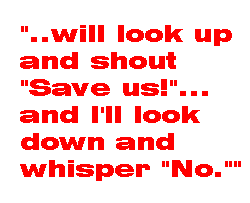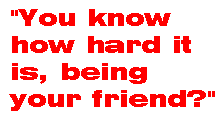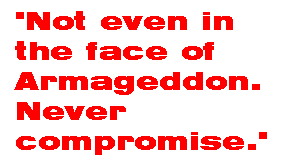GRAPHIC NOVEL AND TRADE
PAPERBACK (TPB) REVIEWS
by The Masked Bookwyrm
The Watchmen
"Qui custodiet ipsos custodes (Who
watches the watchmen?)"
The Watchmen, though set in the United States, was produced by two Brits,
writer Alan Moore and artist Dave Gibbons, and (unlike the painted Batman:
The Dark Knight and Kingdom Come) coloured
by John Higgins in the then-conventional, single-shade comic book style.
Set in an alternate reality featuring original superheroes who conform
to certain vague archetypes (specifically characters published by Charlton
Comics in the '60s), it begins ten years after costumed heroes were outlawed.
The murder of the ultra-right fanatic, The Comedian, one of two heroes
still sanctioned by the government, leads the largely psychotic vigilante
Rorschach (still active, but wanted by the police) to suspect a conspiracy
to bump off ex-superheroes, leading him to get in touch with his former
comrades. For much of the series, the present day conspiracy story
is almost more a backdrop for flashbacks as Moore and Gibbons map out the
post-W.W. II history of these heroes and their predecessors.
 The Watchmen
is by far the most complex of the three. It is also the longest,
features the most "adult" content (cussing, male nudity), and is the least
action/adventure-oriented. And whereas Batman: The
Dark Knight and Kingdom Come presents the backstory
of how their characters reached their current circumstances in (often cryptic)
references, The Watchmen details them meticulously, sometimes presenting
the same flashbacks from different perspectives as we learn more about
these characters and their lives. Lines and scenes take on new meaning
as the series progresses.
The Watchmen
is by far the most complex of the three. It is also the longest,
features the most "adult" content (cussing, male nudity), and is the least
action/adventure-oriented. And whereas Batman: The
Dark Knight and Kingdom Come presents the backstory
of how their characters reached their current circumstances in (often cryptic)
references, The Watchmen details them meticulously, sometimes presenting
the same flashbacks from different perspectives as we learn more about
these characters and their lives. Lines and scenes take on new meaning
as the series progresses.
There is also a "multimedia" approach to the narrative. In addition
to the past and present scenes, the series also cuts away to a pirate story
in a comic book (a comic within a comic -- and a clever idea that, in a
world where superheroes exist, comic books might find another genre to
popularize) as well as text pieces at the back of each issue -- fleshing
out the world by featuring "excerpts" from one of the superheroes' autobiography,
newspaper clippings, etc. The story is densely woven in spots, leading
fans to re-read the series endlessly, deciphering recurring themes, parallel
techniques (in both story and art) and such.
 The series is
undoubtedly very, very clever, but is that truly enough? You can
ooh and ah over the recurring motiffs and visual symbolism (which has led
fans to compile annotated companion papers), you can admire the world-building
and narrative threads (even if the conspiracy plot seems a little short-changed)
but at the end of the day, The Watchmen is missing something vital: a heart.
The series is
undoubtedly very, very clever, but is that truly enough? You can
ooh and ah over the recurring motiffs and visual symbolism (which has led
fans to compile annotated companion papers), you can admire the world-building
and narrative threads (even if the conspiracy plot seems a little short-changed)
but at the end of the day, The Watchmen is missing something vital: a heart.
Alan Moore, it's no stretch to say, doesn't like superheroes: he writes
them simply because that's what dominates the medium. He certainly
doesn't respect them. At least, that seems to be the attitude infusing
both The Watchmen and interviews Moore gave in the early '90s, particularly
for TV's Prisoners
of Gravity (though more recent interviews suggest he may have mellowed
some: recently he shaped his own superhero universe for a comic company).
The Watchmen is intended largely as a 300 plus page indictment
of superheroes, presenting them as fascists, neurotics or arrested adolescents.
And that becomes a problem. If Alan Moore doesn't like or respect
his own characters, how can the reader be expected to?
Which might explain why, despite the volume of pages and the convolutions,
the characters actually seem to evolve less over the course of the story
than they do in, say, Kingdom Come.
 Alan Moore tries
to push emotional buttons: to horrify with a piece of brutality, to amuse
with a character quirk, to sadden with poignancy...but most of it rings
hollow. Frank Miller writes from the gut, but Moore is more academic,
interested in intellectual gamesplaying and Freudian symbolism more than
making his characters live and breathe. Even the ending just sits
there. Like Batman: The Dark Knight, it
provokes moral debate, but it's not really clear what Moore thinks: is
the ending upbeat, downbeat, or neither? It's also a bit silly if
you know anything about real world history -- it wouldn't work,
as the makers of TV's the Outer Limits imply when they first used the idea
30-some years ago (Moore acknowledges this antecedent in the Watchmen).
Though that hasn't stopped the Pollyanna, and morally suspect, concept
(I can't be more explicit without giving too much away) from being used
in a host of (usually SF) stories.
Alan Moore tries
to push emotional buttons: to horrify with a piece of brutality, to amuse
with a character quirk, to sadden with poignancy...but most of it rings
hollow. Frank Miller writes from the gut, but Moore is more academic,
interested in intellectual gamesplaying and Freudian symbolism more than
making his characters live and breathe. Even the ending just sits
there. Like Batman: The Dark Knight, it
provokes moral debate, but it's not really clear what Moore thinks: is
the ending upbeat, downbeat, or neither? It's also a bit silly if
you know anything about real world history -- it wouldn't work,
as the makers of TV's the Outer Limits imply when they first used the idea
30-some years ago (Moore acknowledges this antecedent in the Watchmen).
Though that hasn't stopped the Pollyanna, and morally suspect, concept
(I can't be more explicit without giving too much away) from being used
in a host of (usually SF) stories.
I first read this after the cold war had pretty much thawed, and yet
the fears of nuclear armageddon are very much in the background of the
story. So, to be fair, I did not read it with quite the same real
world baggage Alan Moore and Dave Gibbons probably intended, the way I
did Batman.
 The best issue (and
Moore has cited it as his favourite as well) is #4 -- the Dr. Manhattan
issue. Manhattan perceives time differently than we, and the
issue is a weird odyssey, skipping back and forth through his life, and,
unlike most of the series, it is told via an internal monologue (ala Batman:
The Dark Knight). It encapsulates many of The Watchmen 's
best technical aspects, but this time, with more soul and pathos.
The best issue (and
Moore has cited it as his favourite as well) is #4 -- the Dr. Manhattan
issue. Manhattan perceives time differently than we, and the
issue is a weird odyssey, skipping back and forth through his life, and,
unlike most of the series, it is told via an internal monologue (ala Batman:
The Dark Knight). It encapsulates many of The Watchmen 's
best technical aspects, but this time, with more soul and pathos.
Though Moore has won numerous comic book awards, another weakness is
simply that his dialogue doesn't sell me. Maybe it comes from an
Englishman writing American characters, but the words seem tinny, the colloquialisms
unconvincing and the clever turns of phrase cloying. Moore also,
for the most part, eschews the literary, introspective style of many comics
and goes for the "cinematic"-style Frank Miller used in Ronin
(and subsequently abandoned). Telling the story largely through dialogue
and pictures -- no thought balloons or narration. This means it relies
on his skill as a dialogist, and Gibbons subtlety as an artist, to convey
character nuances...and both men may have overstretched themselves.
The series is at it is best when Alan Moore indulges in internal monologues.
There are also technical weaknesses with the story's foundations.
Like Batman: The Dark Knight and Kingdom
Come, we are supposed to accept a world so intimidated by superheroes
that they are feared and even hated...but, unlike the other series, which
call on the DC pantheonic universe of heroes, in The Watchmen there are
only a half-dozen costumed heroes (and only one with superpowers!).
Hardly the sort of social force to provoke riots.
Gibbons' realist art is technically O.K., but a bit stiff, and the characters
lack any real sense of life.
 The Watchmen
is also rife with...uncomfortable ideas. Moore is celebrated as one
of comicdoms finest writers, embraced by those who seem him as a Liberal
intellectual, a champion against the peurile, adolescent male fantasies
that dominate most comic books. Yet in The Watchmen (or his equally
revered Batman graphic novel, The Killing Joke)
there are elements that seem disconcertingly misogynistic. Women
are frequently brutalized, often without consequence, and mother-figures
demonized. In contrast to Hollis Mason (Night Owl's fatherly mentor)
or even Dr. Manhattan's father whose (ill-fated) admonishment is intended
for his son's own good, we have Laurie's mom, the shrewish, stage-mother
or, in one of the most tiresome and offensive cliches to be employed, we
have Rorschach's instability clearly laid at the feet of his abusive,
prostitute mom (while he fantasizes about a heroic dad he never knew).
In fact, prostitute moms are a recurring motiff in the series. Less
offensive male fantasies also abound, like the fat, bespectacled, middle-aged
Dan Dreiberg romancing the younger, svelter Laurie.
The Watchmen
is also rife with...uncomfortable ideas. Moore is celebrated as one
of comicdoms finest writers, embraced by those who seem him as a Liberal
intellectual, a champion against the peurile, adolescent male fantasies
that dominate most comic books. Yet in The Watchmen (or his equally
revered Batman graphic novel, The Killing Joke)
there are elements that seem disconcertingly misogynistic. Women
are frequently brutalized, often without consequence, and mother-figures
demonized. In contrast to Hollis Mason (Night Owl's fatherly mentor)
or even Dr. Manhattan's father whose (ill-fated) admonishment is intended
for his son's own good, we have Laurie's mom, the shrewish, stage-mother
or, in one of the most tiresome and offensive cliches to be employed, we
have Rorschach's instability clearly laid at the feet of his abusive,
prostitute mom (while he fantasizes about a heroic dad he never knew).
In fact, prostitute moms are a recurring motiff in the series. Less
offensive male fantasies also abound, like the fat, bespectacled, middle-aged
Dan Dreiberg romancing the younger, svelter Laurie.
There are also elements of homophobia. In his deconstructing the
heroic myth of superheroes, Alan Moore paints them as sexually dysfunctional:
rapists, impotent, only able to "perform" in costume, masochistic, or simply
scared of sex...added into this mix is homosexuality, as if Moore is, intentionally
or not, putting homosexuality in the same basket as aberrent sexualities
like rape.
Conversely, The Watchmen is the only one of the three with any gay characters
at all.
In interviews, Moore (at least a few years ago) claimed he had intended
The Watchmen to be the definitive superhero series...and, hopefully, bring
about a close to the entire genre. The ludicrousness of such an ambition
hardly needs commenting on (would anyone write a detective novel, or a
romantic comedy, and seriously expect it to be so good, so "definitive",
that it would render all other works in the genre obsolete? Would
anyone even want to?). However, many of the series' fans argue that
he succeeded. Some have even gone so far as to claim that if superheroes
existed, they would have to be like The Watchmen (a highly debatable statement
in itself).
But that's the point: superheroes don't exist. That may
be part of the problem: The Watchmen is a fantasy series about (largely)
fantasy issues.
Furthermore, the series, at best, presents a cynical view of comic book
heroes, rather than a realistic look at what real life superheroes might
be. Moore's world is still predominantly white, male (mightn't real
life superheroes be disproportionately minorities, since a superhero would,
logically, be someone disillusioned with the status quo?) and seem to have
few concerns outside of fixating on their costumed identities. Even
mainstream, less "adult" comic book heroes like Spider-Man recognize superheroes
would have problems like everyone else: bills to pay, appointments to meet.
In the end, not only did Moore not write "the definitive" superhero
series -- no one could -- he didn't even write the definitive superhero-comes-out-of-retirement-on-the-eve-of-a-potential-
Apocalypse. Miller did one equally valid, and ten years later, two
guys named Waid and Ross also took a kick at the can.
On to Kingdom Come
Back to Intro
Or Back to 
 The Watchmen
is by far the most complex of the three. It is also the longest,
features the most "adult" content (cussing, male nudity), and is the least
action/adventure-oriented. And whereas Batman: The
Dark Knight and Kingdom Come presents the backstory
of how their characters reached their current circumstances in (often cryptic)
references, The Watchmen details them meticulously, sometimes presenting
the same flashbacks from different perspectives as we learn more about
these characters and their lives. Lines and scenes take on new meaning
as the series progresses.
The Watchmen
is by far the most complex of the three. It is also the longest,
features the most "adult" content (cussing, male nudity), and is the least
action/adventure-oriented. And whereas Batman: The
Dark Knight and Kingdom Come presents the backstory
of how their characters reached their current circumstances in (often cryptic)
references, The Watchmen details them meticulously, sometimes presenting
the same flashbacks from different perspectives as we learn more about
these characters and their lives. Lines and scenes take on new meaning
as the series progresses.
 The series is
undoubtedly very, very clever, but is that truly enough? You can
ooh and ah over the recurring motiffs and visual symbolism (which has led
fans to compile annotated companion papers), you can admire the world-building
and narrative threads (even if the conspiracy plot seems a little short-changed)
but at the end of the day, The Watchmen is missing something vital: a heart.
The series is
undoubtedly very, very clever, but is that truly enough? You can
ooh and ah over the recurring motiffs and visual symbolism (which has led
fans to compile annotated companion papers), you can admire the world-building
and narrative threads (even if the conspiracy plot seems a little short-changed)
but at the end of the day, The Watchmen is missing something vital: a heart.
 The best issue (and
Moore has cited it as his favourite as well) is #4 -- the Dr. Manhattan
issue. Manhattan perceives time differently than we, and the
issue is a weird odyssey, skipping back and forth through his life, and,
unlike most of the series, it is told via an internal monologue (ala Batman:
The Dark Knight). It encapsulates many of The Watchmen 's
best technical aspects, but this time, with more soul and pathos.
The best issue (and
Moore has cited it as his favourite as well) is #4 -- the Dr. Manhattan
issue. Manhattan perceives time differently than we, and the
issue is a weird odyssey, skipping back and forth through his life, and,
unlike most of the series, it is told via an internal monologue (ala Batman:
The Dark Knight). It encapsulates many of The Watchmen 's
best technical aspects, but this time, with more soul and pathos.
 The Watchmen
is also rife with...uncomfortable ideas. Moore is celebrated as one
of comicdoms finest writers, embraced by those who seem him as a Liberal
intellectual, a champion against the peurile, adolescent male fantasies
that dominate most comic books. Yet in The Watchmen (or his equally
revered Batman graphic novel,
The Watchmen
is also rife with...uncomfortable ideas. Moore is celebrated as one
of comicdoms finest writers, embraced by those who seem him as a Liberal
intellectual, a champion against the peurile, adolescent male fantasies
that dominate most comic books. Yet in The Watchmen (or his equally
revered Batman graphic novel, 